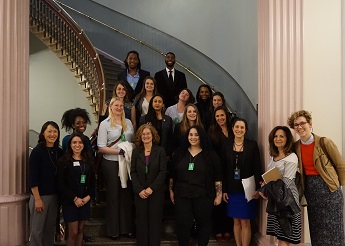When it comes to ending college sexual assault, we ALL need to be leaders

Last month, I had the opportunity to join the ten other FUTURES Campus Leaders for a meeting at the White House with members of the White House Task Force to Protect Students from Sexual Assault (Task Force). Launched in January 2014, the Task Force’s goal is to “help schools live up to their obligation to protect students from sexual violence.” As someone who has been working in the field of sexual violence prevention for the past seven years, and as a current master’s student in UC Berkeley’s School of Social Welfare, it was an incredibly thrilling experience to meet with the federal officials charged with ending such
violence once and for all.
While the members of the Task Force have great expertise and influence, I’ve learned that it takes leadership at every level to create sustainable change. As I sat
in the meeting room in the White House’s Eisenhower Executive Office Building, I was particularly impressed with the work each of my fellow Campus Leaders has been doing in their community. From awareness campaigns and peer education to campus policy advocacy and staff training, each leader offered a critical perspective into how to create safer campus communities.
“While the members of the Task Force have great expertise and influence, I’ve learned that it takes leadership at every level to create sustainable change.”
The significance of leadership across all levels was highlighted for me when I returned to Berkeley in the days following the Task Force meeting. The university has been trying to address a recent flood of allegations that involve a lack of consistency when it comes to holding faculty and staff accountable when they harass or assault students and colleagues. While this is not a new issue for the school (in fact, the University of California formed its own system-wide task force in the summer of 2014 to address sexual assault on all of its ten campuses), students and community members have been speaking up more than ever before.
“Perhaps most important, we need to keep saying to everyone out there who has ever been assaulted: you are not alone. We have your back. I’ve got your back.”
-President Barack Obama, January 22, 2014
We are at a critical juncture when it comes to preventing sexual violence on college campuses. Those of us who have been on the ground doing the work have felt this movement building for some time. People who are new to the issue are often simultaneously shocked by the prevalence of sexual assault and eager to jump in and do their part to create change. And, all the while, more survivors are bravely contributing in any way they can―from taking care of themselves and getting support, to widely sharing their stories.
“We need everyone on campus—undergraduates, graduate students, faculty, staff, administrators—and everyone who cares about the campus community—prospective college students, parents of students, alumnae, legislators—to stand together.”
It’s time for us to acknowledge the power of leadership coming from every level. As exciting as it is to join other student leaders in meeting with the White House Task Force, it’s far from enough. We need everyone on campus—undergraduates, graduate students, faculty, staff, administrators—and everyone who cares about the campus community—prospective college students, parents of students, alumnae, legislators—to stand together. Each and every member of a college campus community deserves safety and respect, and it’s on us to hold schools accountable until it happens.
 Elizabeth Wilmerding is currently a first-year master’s student in UC Berkeley’s School of Social Welfare. She has a background in the prevention of sexual assault, domestic violence, and suicidality. Elizabeth lives in Oakland, CA.
Elizabeth Wilmerding is currently a first-year master’s student in UC Berkeley’s School of Social Welfare. She has a background in the prevention of sexual assault, domestic violence, and suicidality. Elizabeth lives in Oakland, CA.





